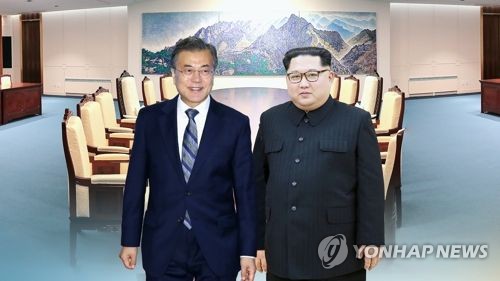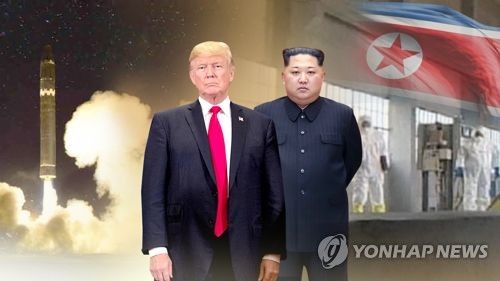A year after his inauguration, South Korean President Moon Jae-in's drive for cross-border reconciliation and peace is starting to bear fruit, with Pyongyang veering toward denuclearization talks after years of saber-rattling.
A hotline between Moon and North Korean leader Kim Jong-un has been established. Their historic summit last month has yielded long-awaited agreements to reduce military tensions, enhance bilateral cooperation and pursue "complete denuclearization."
These were unthinkable as recently as late last year, as the communist state continued its menacing rhetoric and provocative streak, hewing to its two-pronged policy of simultaneously developing its nuclear program and economy.
Analysts said that the growing mood for peace was a product of Moon's delicate mediation between U.S. President Donald Trump and Kim, who are expected to meet in the coming weeks over Pyongyang's denuclearization.
But Moon's peace initiative could face a string of challenges ahead, such as technically complex denuclearization procedures, a potential conflict of geopolitical interests among major powers and not least attacks from his political foes at home.
"Despite a series of variables, Moon, based on a principled approach, has kept an even keel," Park Won-gon, a foreign policy expert at Handong Global University, told Yonhap News Agency.
"His principle was to seek dialogue and a compromise to address the nuclear quandary, while ensuring that his country does not fall out of sync with Washington despite its ally's somewhat different approach and policy tools," he added.

Since his election last May, Moon has been pursuing dialogue with Pyongyang, which critics warned could fuel a rift with Washington bent on a "maximum pressure" campaign and further embolden the wayward state.
Some detractors also argued that the liberal president could replicate a failure of late former President Roh Moo-hyun, who was elected on a nationalist vow "not to kowtow to America." Moon was chief of staff to Roh, who led the country from 2003-2008.
But such concerns have proved to be unfounded, as Seoul has gingerly maintained close coordination with its ally, Washington, while building trust with Pyongyang with the consistent message: no intentions for a regime change or any forced reunification by absorption.
"One concern was that Moon could take an ideology-based diplomacy that Roh employed, given that Moon was elected based on backing from the same liberal political base as Roh's," said Kim Tae-hyun, diplomacy professor at Chung Ang University.
"But Moon's approach has been a far cry from Roh's formula that was characterized as being friendly to the North and China, and unfriendly to the U.S., and gave rise to a pragmatic approach by Roh's successor, Lee Myung-bak," he added.
Moon's ambitious push for peace has confronted hurdles from within his country as well.
As the North stuck to its belligerent tack with its sixth nuclear test in September and a fusillade of ballistic missile tests, conservative parties derided Moon's policy as "too weak, naive and placatory" to handle the unruly regime.
But the political offensive has been waning, with Moon's supporters lambasting hawkish right-wingers as "anti-peace forces" and the president pressing ahead with his policy on the back of high public support.
Last week, a Gallup Korea survey put Moon's approval rating at 83 percent, up 10 percentage points from a week earlier. The local pollster attributed the rise partially to last month's third inter-Korean summit.
But there is no room for complacency, experts cautioned, noting many obstacles that lie before the "complete" denuclearization. For instance, Washington's high verification standards, coupled with Pyongyang's distrust toward its archenemy, could derail Moon's peace crusade.

The U.S. has recently been seen raising the stakes for the looming denuclearization talks. New U.S. Secretary of State Mike Pompeo recently mentioned the "permanent, verifiable, irreversible dismantling" of the North's nuclear program.
"It is good to improve cross-border relations ... but the tricky part is that Seoul could be played by Pyongyang, which could rehash its old tactics of buying time through protracted negotiations, and that could be a situation likely to corrode Seoul's trust with Washington," said Chun In-young, professor emeritus at Seoul National University.
"So, Seoul could face a serious policy dilemma between Washington and Pyongyang," he added.
Moon's scorecards on relations with China and Japan are mixed.
Though Beijing appears to be easing its measures taken in retaliation for Seoul's agreement to host a U.S. anti-missile system, distrust still lingers between the former Cold War foes. Japan's wartime sexual enslavement of Korean women, along with its persistent claim to Korea's easternmost islets of Dokdo, remains an abiding source of tension in bilateral ties.
"Seoul appears to pay too much heed to its ties with Pyongyang and Washington, when it needs a more balanced approach with due attention to China as well," said Choo Jae-woo, Chinese foreign policy professor at Kyung Hee University.
Another policy feature that sets Moon apart from his predecessors is his strategic focus on the 10-member Association of Southeast Asian Nations (ASEAN) under his "New Southern Policy."
Moon has sought to firm up the relationship with ASEAN to the level of Seoul's ties with four major powers, which are the U.S., China, Japan and Russia, due to its geopolitical value, growth potential and rich resources.
The ASEAN community with around 630 million people -- the world's third-greatest population after China and India -- boasts strategic locations linking the Indo-Pacific region that hosts the world's most crucial trading and energy supply routes -- a reason why major countries have been vying for influence over the bloc.
"Though it is still premature to evaluate, Moon's policy is going in the right direction, given that ASEAN is geographically situated at Asia's fulcrum of growth that links India and China," said Lee Sun-jin, diplomacy professor at Sogang University.

